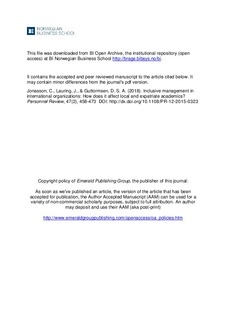Inclusive management in international organizations: How does it affect local and expatriate academics?
Journal article, Peer reviewed
Accepted version
Permanent lenke
http://hdl.handle.net/11250/2488735Utgivelsesdato
2018Metadata
Vis full innførselSamlinger
- Publikasjoner fra CRIStin - BI [1015]
- Scientific articles [2181]
Sammendrag
Purpose: A growing number of academics relocate abroad to work as expatriates in the university sector. While this employee group seems to have a highly constructive influence on the performance of university organizations, some problems in relation to effective inclusion of these individuals have been noted. In order to further advance the theoretical understanding regarding integration efforts in international university organizations, the purpose of this paper is to explore how two types of inclusive management, empowering management (identity-blind) vs English management communication (identity-conscious), affect local and expatriate academics.
Design/methodology/approach: Using responses generated from a survey of 792 local and 620 expatriate academics, this paper assesses the effects of inclusive management on job engagement and stress among the two groups.
Findings: The results show that one type of inclusive management, empowering management (identity-blind), has a favorable influence on job engagement and stress in both subsamples. The other type, English management communication (identity-conscious), increases stress for local academics but has no effect on the expatriates. These findings are useful for theory development in relation to employee inclusion in international organizations.
Originality/value: The authors have little knowledge about how inclusive management functions in international organizations. Testing the effect of identity-blind and identity-conscious inclusive management practices among two different groups of local and expatriate academics provides new insight to this area. In particular, the use of English management communication provides new knowledge on the integration of majority and minority groups in international organizations.
Beskrivelse
The accepted and peer reviewed manuscript to the article
